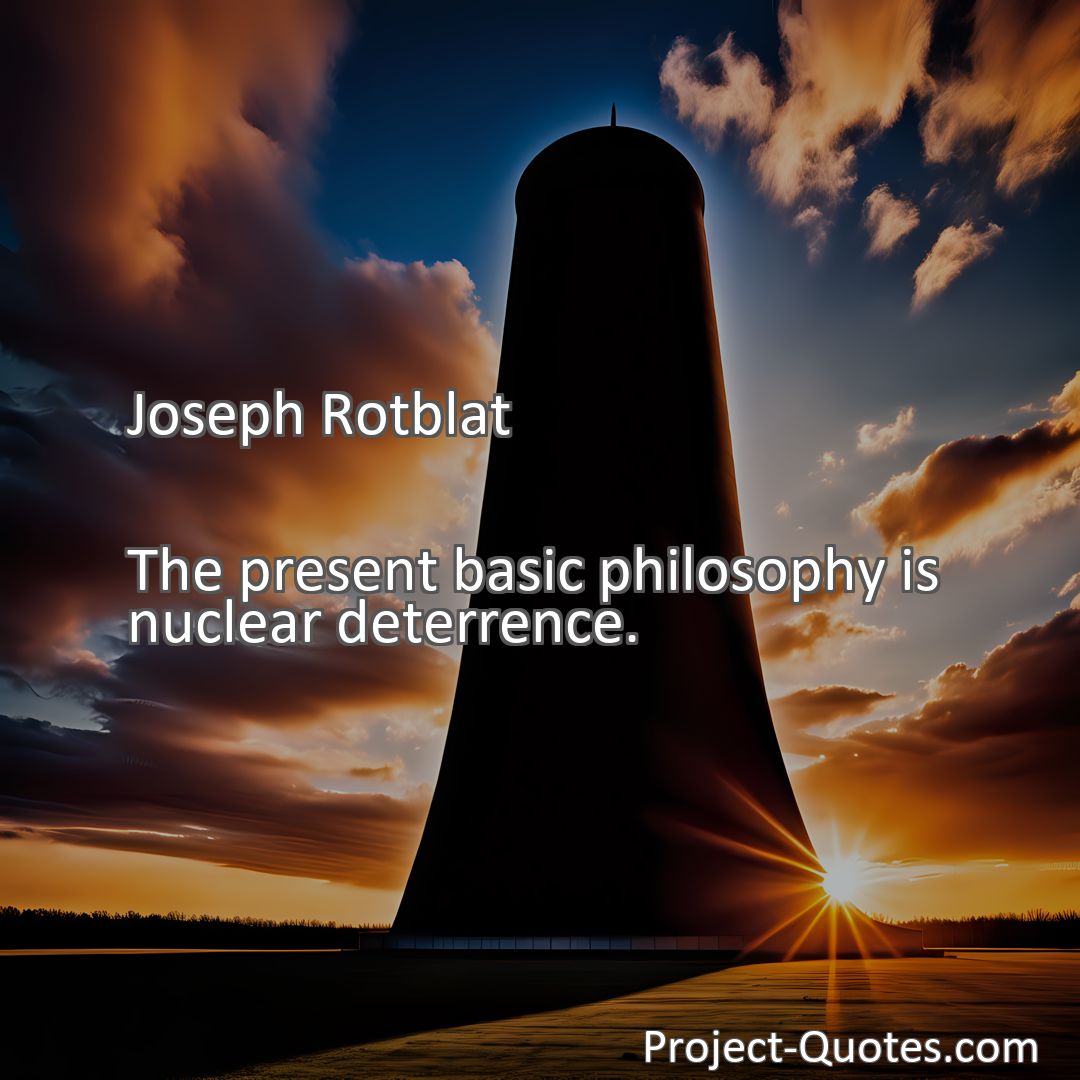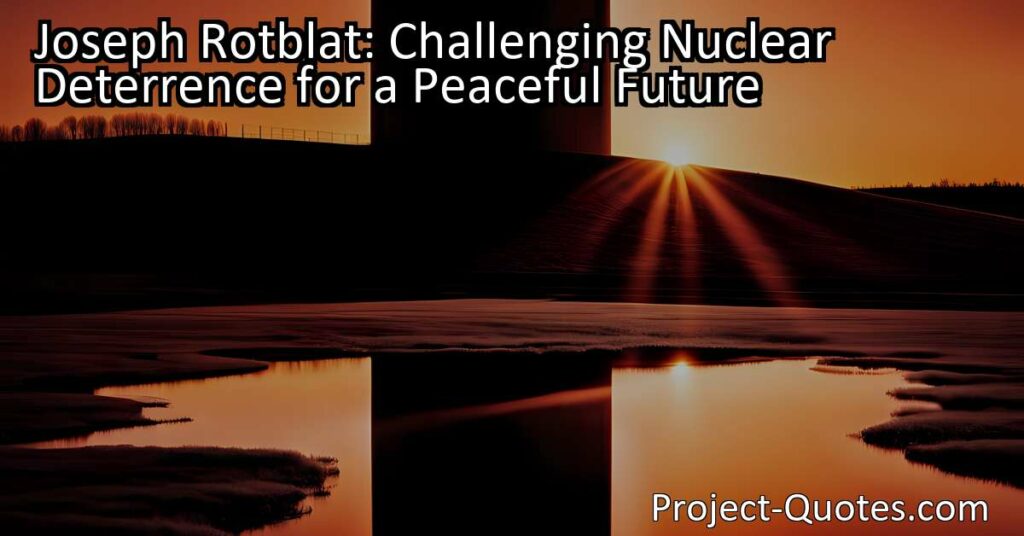The present basic philosophy is nuclear deterrence.
Joseph Rotblat
Joseph Rotblat, a wise man, believed in working together to solve problems and create a peaceful future. He understood that relying on nuclear deterrence and fear of retaliation was not the best way to keep the peace. Instead, he believed in using friendship, understanding, and cooperation to build a world free from the threat of nuclear weapons.
Table of Contents
Meaning of Quote – The present basic philosophy is nuclear deterrence.
Hello there! The quote we’re exploring today comes from a very knowledgeable man named Joseph Rotblat. Rotblat was a scientist with some pretty important ideas. He once said, “The present basic philosophy is nuclear deterrence.” Now, that sounds like a mouthful, but let’s break it down and chat about what he meant.
“Nuclear deterrence” is a fancy phrase that grown-ups use when they talk about one of the ways countries try to keep peace and make sure that no one starts a fight using nuclear weapons. Nuclear weapons are super powerful bombs that can cause a lot of damage – not just to buildings, but they can hurt lots of people and the environment too. So, when countries have these weapons, they hope that their power will discourage or “deter” other countries from attacking them, because they know they could get hit back just as hard. It’s kind of like having a big brother who’s a champion in karate – nobody wants to mess with you because they know your big brother has your back.
Now, this idea of nuclear deterrence has been around for a while, especially since the end of World War II when nuclear weapons were first used. Countries like the United States and Russia started making lots of these bombs, and it became like a standoff in an old western movie, where two cowboys have their hands on their pistols, waiting to see who draws first. Everyone is on edge because they know whoever acts first will start a huge, dangerous battle that could hurt many people.
Some say this kind of standoff actually keeps the world safer because it makes countries think twice before starting a war. If everyone knows how much damage a nuclear war would cause, then maybe they’ll work harder to solve their problems in peaceful ways instead.
But Joseph Rotblat, the man who said our quote, was worried about this strategy. He was one of the scientists who worked on creating nuclear weapons, but he did something very brave. When he saw that these weapons could lead to serious danger for the whole world, he left the project. He decided it wasn’t the right way to keep peace, and he spent the rest of his life working to stop the spread of nuclear weapons.
Rotblat thought that the idea of nuclear deterrence was like playing a very risky game. It works on the hope that no one will ever actually use nuclear weapons again. He felt that relying on this fear to keep people safe wasn’t the best plan because it was based on always being ready for war, rather than working towards real, lasting peace.
Also, there’s the chance of accidents or misunderstandings. Imagine if someone thought they saw a wolf outside the village and sounded the alarm, but it was just a big, shaggy dog. Everyone might panic, and things could get out of control. In the real world of nuclear weapons, if one country gets scared or confused and thinks they’re about to be attacked, they might launch their own weapons first. This could lead to a terrible war by mistake.
And what about rogue states – or countries that don’t follow the same rules as everyone else – or terrorists getting their hands on nuclear weapons? The idea of nuclear deterrence doesn’t work so well then. These groups might not be stopped by the fear of retaliation like countries are. This is something that people thinking about how to keep the world safe really worry about.
Nuclear deterrence also doesn’t solve the issues that lead to conflict in the first place. It’s like when two kids in the playground are staring each other down but not actually fixing their argument. Things might seem calm on the surface, but underneath, the disagreement and the anger are still there. Without solving the real problemslike disagreements over land, resources, or different beliefs peace isn’t truly being made, it’s just being postponed.
Joseph Rotblat also knew something important about people and the world: we can change things if we work together. Instead of countries focusing on who has the bigger or more dangerous weapons, he dreamed of a world where they would work on solving their problems through talking and understanding each other.
This idea is a little bit like a group project at school. If everyone works together, sharing ideas and listening, the group can create something great. But if everyone is trying to outdo each other and not communicating, then nothing good gets done. Rotblat believed that it was up to us humans all of us sharing this planet to talk, to learn, and to work out ways to live in peace.
He thought that we should use our smarts and technology for good stuff, like making medicine, creating energy that doesn’t pollute, and understanding our world better, instead of making weapons. That way, we build up our world, rather than risk tearing it down.
Joseph Rotblat was a smart man who saw that nuclear weapons could cause a whole bunch of trouble. He wanted people to think about whether always being ready for war was the best way to keep peace. He believed in working towards a world where the thought of using those weapons would be just a scary story from the past. Instead of using fear to keep the peace, he thought we should use friendship, understanding, and cooperation. It’s like building a bridge instead of a wall it connects people instead of dividing them.
So, let’s remember Rotblat’s message and think about how we can all be part of building a peaceful future. It’s about understanding that the strongest power we have isn’t in bombs or threats, but in our ability to work together for a better world. It’s not an easy task, but it’s definitely a goal worth aiming for!
I hope this quote inspired image brings you hope and peace. Share it with someone who needs it today!


